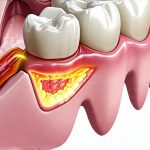Chewing gum is seemingly innocuous – a ubiquitous habit for many, offering fresh breath, a momentary distraction, or even purported concentration benefits. From childhood bubblegum to sugar-free options aimed at dental health, it’s woven into the fabric of daily life. But increasingly, questions arise about its impact beyond the mouth. As our understanding of the gut microbiome and its profound influence on overall health expands, people are beginning to scrutinize seemingly harmless habits like chewing gum, wondering if they might be inadvertently disrupting this complex ecosystem. This article delves into the potential links between chewing gum consumption and gut issues, examining the ingredients, physiological effects, and current research surrounding this topic.
The concern isn’t necessarily about a direct ‘gum-causes-gut-problems’ scenario, but rather a more nuanced exploration of how certain components in gum – artificial sweeteners, sugar alcohols, emulsifiers, and even the chewing process itself – might interact with the digestive system. It’s important to note that individual responses can vary significantly; what affects one person may not affect another. Factors like pre-existing gut conditions, dietary habits, and overall health play a crucial role in determining susceptibility to any adverse effects. This investigation will aim to provide a comprehensive overview of these potential interactions, empowering readers to make informed choices about their gum-chewing habits. Perhaps starting with small choices is the best approach.
The Composition of Chewing Gum & Potential Gut Disruptors
The vast majority of commercially available chewing gums share certain core ingredients that are relevant when considering gut health. While formulations differ between brands and flavors, several components consistently appear and have been the subject of scrutiny. Sugar, or more commonly sugar alcohols and artificial sweeteners in sugar-free varieties, form a significant part. Common sugar alcohols include sorbitol, mannitol, xylitol, and erythritol; these are often used to provide sweetness without contributing significantly to tooth decay but can cause digestive upset in some individuals. Artificial sweeteners like aspartame, sucralose, and saccharin are also prevalent, raising concerns about their impact on the gut microbiome. Beyond sweeteners, gums typically contain a gum base (often a blend of polymers, resins, and waxes), flavoring agents, softeners like glycerin, and emulsifiers to maintain texture and consistency.
Emulsifiers, in particular, have garnered attention from researchers. These substances help bind ingredients together but some studies suggest they can disrupt the gut barrier function. Lecithin, carboxymethylcellulose (CMC), and polysorbate 80 are examples commonly found in chewing gum. They may alter the composition of the gut microbiome, potentially promoting inflammation and increasing intestinal permeability – often referred to as “leaky gut.” The chewing process itself also plays a role. Increased saliva production stimulates digestion, but prolonged or excessive chewing can lead to swallowing more air (aerophagia), which contributes to bloating and gas. It’s important to remember that sometimes rest is the best course of action when dealing with digestive discomfort.
Finally, the very nature of gum – being largely indigestible – means it passes through the digestive system relatively unchanged. While not directly causing harm in most cases, this indigestibility could theoretically interfere with normal gut motility and nutrient absorption for some individuals. It’s important to remember that these components don’t necessarily cause problems for everyone, but they represent potential areas of concern for those with sensitive digestive systems or pre-existing conditions. If you are struggling, making space can be helpful.
The Role of Artificial Sweeteners & Sugar Alcohols
The shift toward sugar-free gum has been largely driven by dental health concerns, yet it introduces a different set of questions related to gut health. Sugar alcohols are poorly absorbed in the small intestine and instead ferment in the colon by bacteria. This fermentation process produces gas, leading to symptoms like bloating, abdominal discomfort, and diarrhea – especially in individuals sensitive to these compounds. The degree of sensitivity varies greatly; some people can tolerate moderate amounts without issue, while others experience significant distress even with small quantities. Xylitol, for instance, is known to have a laxative effect when consumed in large doses.
Artificial sweeteners like aspartame and sucralose are different but also raise concerns about their impact on the gut microbiome. Some research suggests that these sweeteners can alter the composition of gut bacteria, reducing beneficial species and promoting the growth of potentially harmful ones. This imbalance, known as dysbiosis, has been linked to a range of health issues, including inflammatory bowel disease (IBD), obesity, and metabolic syndrome. While studies are ongoing and results are often conflicting, there’s growing evidence that artificial sweeteners aren’t metabolically inert – they can actively interact with the gut ecosystem.
Furthermore, the sweet taste itself may play a role. The brain anticipates glucose when it detects sweetness, triggering insulin release. When no actual glucose arrives (as in the case of sugar-free gum), this discrepancy could potentially disrupt metabolic processes and impact gut health over time. It’s crucial to acknowledge that research on these effects is still evolving, but the potential for artificial sweeteners and sugar alcohols to influence the gut microbiome warrants careful consideration. Dealing with fear surrounding long term gut issues can also be important here.
The Impact on Gut Motility & Digestion
Chewing gum encourages saliva production, which aids in initial food breakdown and digestion. This can be beneficial for some, particularly those with digestive difficulties. However, prolonged or excessive chewing can also lead to swallowing excess air – aerophagia. Swallowed air accumulates in the gastrointestinal tract, causing bloating, belching, and flatulence. This effect is more pronounced in individuals prone to gas or irritable bowel syndrome (IBS). The act of chewing itself stimulates gastric acid secretion, which could exacerbate symptoms for those with conditions like heartburn or acid reflux.
Beyond aerophagia, the indigestible nature of gum can potentially disrupt normal gut motility. As gum passes through the digestive system largely unchanged, it adds bulk and may interfere with the coordinated muscle contractions that move food along the intestinal tract. This can lead to constipation in some individuals or, conversely, contribute to diarrhea if the body attempts to rapidly eliminate the indigestible material. The impact on gut motility is likely influenced by factors like hydration levels, fiber intake, and individual sensitivity.
Gut Barrier Function & Inflammation
The gut barrier – a single layer of cells lining the intestinal wall – plays a crucial role in protecting the body from harmful substances while allowing nutrients to be absorbed. Emerging research suggests that certain components of chewing gum, particularly emulsifiers, may compromise this barrier function. Emulsifiers can disrupt the mucus layer that protects the gut lining and promote inflammation, increasing intestinal permeability – often referred to as “leaky gut.”
Increased intestinal permeability allows undigested food particles and toxins to enter the bloodstream, triggering an immune response and potentially contributing to systemic inflammation. This chronic inflammation has been linked to a wide range of health problems, including autoimmune diseases, allergies, and mood disorders. While more research is needed to fully understand the extent of this effect, it’s a growing area of concern for those interested in optimizing gut health. Compassion can be vital when dealing with chronic inflammation.
Identifying Sensitivity & Mitigation Strategies
Determining whether chewing gum contributes to gut issues often requires careful observation and potentially, elimination strategies. – Start by tracking your symptoms: Keep a food diary that includes details about gum consumption and any associated digestive discomfort (bloating, gas, diarrhea, constipation). – Consider an elimination diet: Temporarily remove chewing gum from your diet for a few weeks and monitor whether your symptoms improve. – Pay attention to ingredients: If you suspect specific components are causing problems (e.g., sorbitol, aspartame), choose gums without those ingredients or opt for natural alternatives.
If you have pre-existing gut conditions like IBS or IBD, it’s particularly important to be mindful of your gum consumption and consult with a healthcare professional. – Choose sugar-free gum cautiously: If you must chew gum, select options sweetened with erythritol or stevia – these tend to cause less fermentation in the colon compared to other sugar alcohols. – Limit chewing time: Reduce the duration of each chewing session to minimize air swallowing. – Stay hydrated: Drinking plenty of water can help maintain gut motility and reduce bloating.
Ultimately, being aware of the potential impact of chewing gum on your gut health empowers you to make informed choices that support your overall well-being. It’s not about demonizing gum entirely but rather understanding its potential effects and adjusting your habits accordingly. You may also find functional relief helpful in managing symptoms. Additionally, building support networks can offer invaluable emotional support during this process.


















